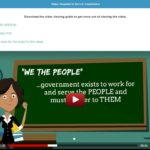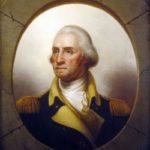The Supreme Court has the power to interpret the Constitution. Its rulings on cases determine the meaning of laws and acts of Congress and the president. Knowing the key decisions of the Supreme Court and the precedents they set is vital in understanding the meaning of laws, how our country has changed over time, and the direction the country is currently headed. In this lesson students will examine the case of Roe v. Wade.
Preamble of the Constitution Activity Sheet
Students can use this activity sheet to draw ideas about what different phrases and words in the Preamble mean.
Learning about the Preamble to the U.S. Constitution

This resource provides students with an English language video and associated student friendly readings (in English, Spanish, and Haitian Creole), as well as reading and video guides and self assessment tools. Using these, students will explore the meaning and importance of the Preamble.
Free registration is required to use the resource.
George Washington and the Presidency

This short video highlights the crucial role played by George Washington in writing upon the “blank slate” of the Constitution. Washington was self-conscious about the importance of establishing principled precedents in his interpretation of Article II and what it said—or did not say—about the extent of executive power. According to Professor W. B. Allen, Washington was “conscious and deliberate” as he and his advisors gave meaning to the outline of the Constitution.
To Sign or Not to Sign
Students will consider the arguments made by members of the Continental Congress regarding whether or not to sign the Declaration of Independence. They will also have the opportunity to analyze each section of the Declaration to understand its meaning and consider the consequences of signing the document.
IRL 1: Free Speech in Schools Podcast
We’re digging into four incredibly important Supreme Court cases – four cases that have shaped how we interpret the meaning of free speech in public schools. Is political protest allowed in class? Is lewd speech covered by the First Amendment? Can school administrators determine what students can and can’t say in the school newspaper? Listen in, and find out how students and schools have gone head to head over how First Amendment rights apply in a public school setting.
14th Amendment: Battles for Equality
The 14th Amendment wrote the Declaration of Independence’s promise of freedom and equality into the Constitution. It transformed the Constitution forever. And it’s at the heart of what many scholars refer to as America’s “Second Founding.” Even so, the 14th Amendment is the focus of many of the most important constitutional debates (and Supreme Court cases) today. In many ways, the history of the modern Supreme Court is really a history of modern-day battles over the 14th Amendment’s meaning. Nearly every constitutional case that you care about today turns on the 14th Amendment.
Martin’s Big Words
In this lesson, students will experience unequal treatment first hand – some will receive a sticker based on an arbitrary characteristic, like hair color – and by discussing their reactions, they will come to understand the meaning of equality. Students will learn about the life and dream of Dr. Martin Luther King and write about what his dream for equality means in their own lives.
Realizing the Dream Today
Students will analyze a political cartoon depicting Dr. Martin Luther King Jr. and the title of his famous speech, “I Have a Dream.” Discussion of the meaning of the cartoon leads into a more general conversation about rights and equality.
Right to Counsel
In this lesson, students will look at the various dimensions of right to counsel. They will study how the meaning of this right has evolved over time with reference to specific landmark United States Supreme Court cases. Students will develop lists of reasons why such a right is important to the functioning of the adversary process. The lesson ends with an examination of the role of the criminal attorney.